What are Mandarin characters?
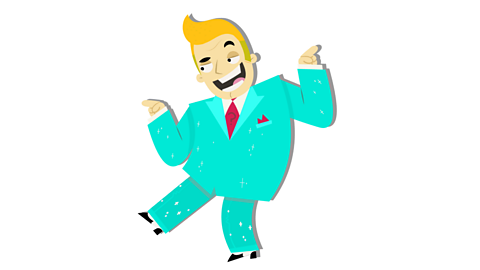
Unlike the English language, which uses the Roman alphabet, Mandarin does not have an alphabet.
Instead there are Mandarin characters, called Sorry, something went wrongCheck your connection, refresh the page and try again. hàn zì, and each character represents a syllable. Most words have one, two or three characters.
Each Mandarin character is made from different components.

Mandarin characters with Burt Bessington
Burt: Hello and welcome to…
Librarian: Shh!
Burt: Oh, sorry, Words of the World!
Mandarin characters have developed over approximately 4,000 years.
But Mandarin characters aren't letters that tell you how a word sounds - they're more like pictures or symbols.
You see, the original form of the characters have changed over time to the characters used today.
On with the quiz!
Librarian: Shh!
Burt: Try to match the pictures with these Mandarin characters.
Children: Err… This one, this one… And this one.
Burt: Correct! Someone's been doing their homework!
Librarian: SHHHHHH!
Burt: The characters for mountain and tree look like the words they represent.
There are around 3,500 common Mandarin characters.
These are all made from different components.
Components are like the building blocks of characters and occur in different places in different characters.
See if you can spot the same component in these characters!
Children: There, there and there.
Burt: Correct!
The meaning component for mouth is in all these characters!
You win our star prize, this megaphone!
Librarian: CONGRATULATIONS!
Children: SHHHHHHH!
Components of a character
There are usually two components to a character:
- a radical
- a phonetic
Let's look at both of these in the character Sorry, something went wrongCheck your connection, refresh the page and try again. mā (mother):
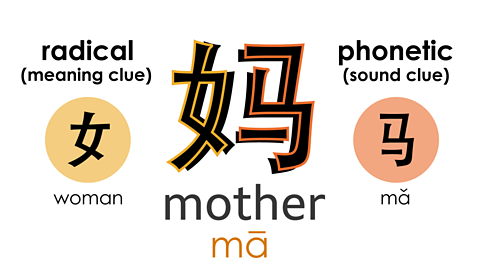
Radical
The radical gives you a clue to the character's meaning.
For example, in the character Sorry, something went wrongCheck your connection, refresh the page and try again. mā meaning ‘mother’ the radical is Sorry, something went wrongCheck your connection, refresh the page and try again. nǚ (woman) because of the connection often made between mothers and women.
Phonetic
The other part of the character is called the phonetic (pronunciation).
In the ancient form of the language this showed how the character was pronounced and in modern Mandarin it can sometimes give you a clue about the pronunciation, for example 马 mǎ (horse) in Sorry, something went wrongCheck your connection, refresh the page and try again. mā (mother).
Warning! The phonetic is only a clue, not an accurate guide.
For example, in the character Sorry, something went wrongCheck your connection, refresh the page and try again. kàn (to look at), the radical is Sorry, something went wrongCheck your connection, refresh the page and try again. mù (eye), which helps with the meaning, but the phonetic Sorry, something went wrongCheck your connection, refresh the page and try again. shǒu (hand) does not give any guide to pronunciation.
Also, sometimes the radical is the whole character, like in 马 mǎ (horse), so there is no phonetic component.
To know how to pronounce a character you'll need to know its pinyin.
Mandarin characters started out more like ‘pictures’ but have changed over 4,000 years into the Mandarin characters used today.
This can be seen clearly in the development of the character for 'mountain' (Sorry, something went wrongCheck your connection, refresh the page and try again. shān):

The smallest units of Mandarin characters are strokes.
Click below to download a template for practicing how to write Mandarin characters
Practice writing Mandarin characters
Download the PDF and use the grid to help you practice writing Mandarin characters.

More on Language skills: Knowledge about language
Find out more by working through a topic
- count2 of 5
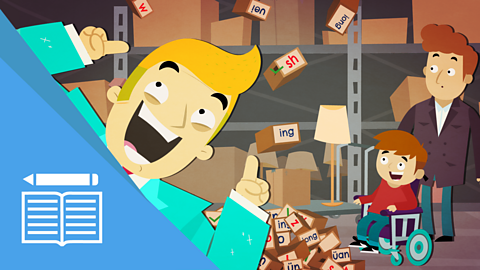
- count3 of 5
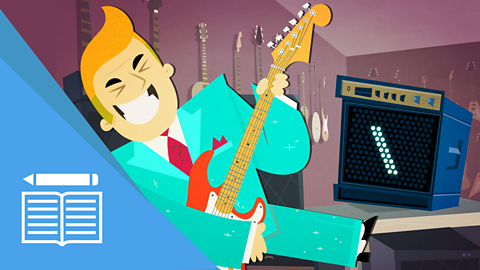
- count4 of 5
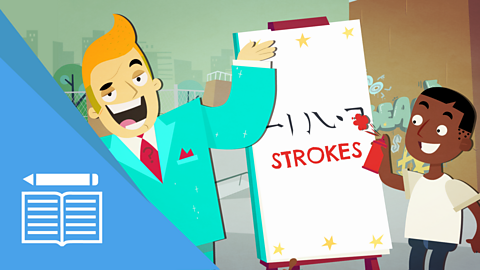
- count5 of 5
